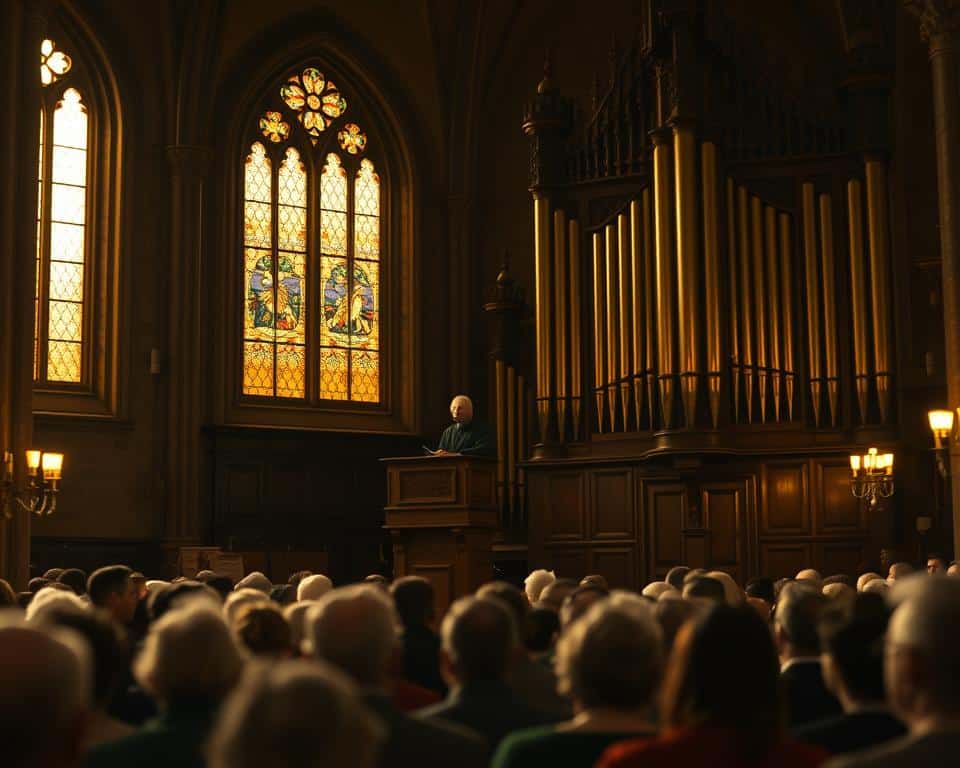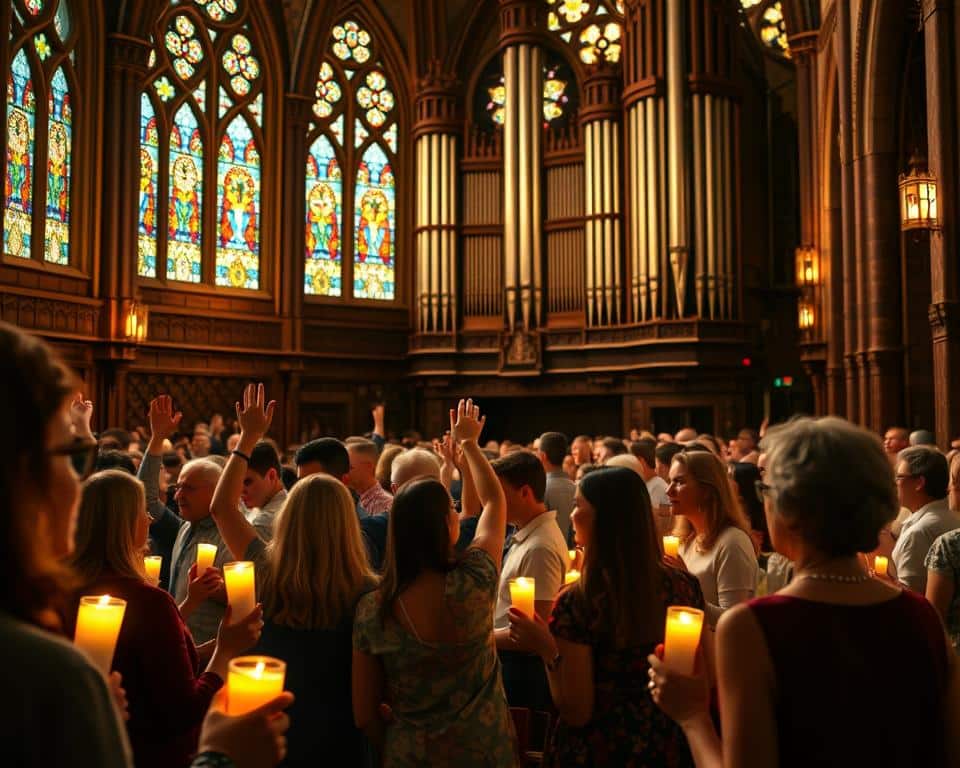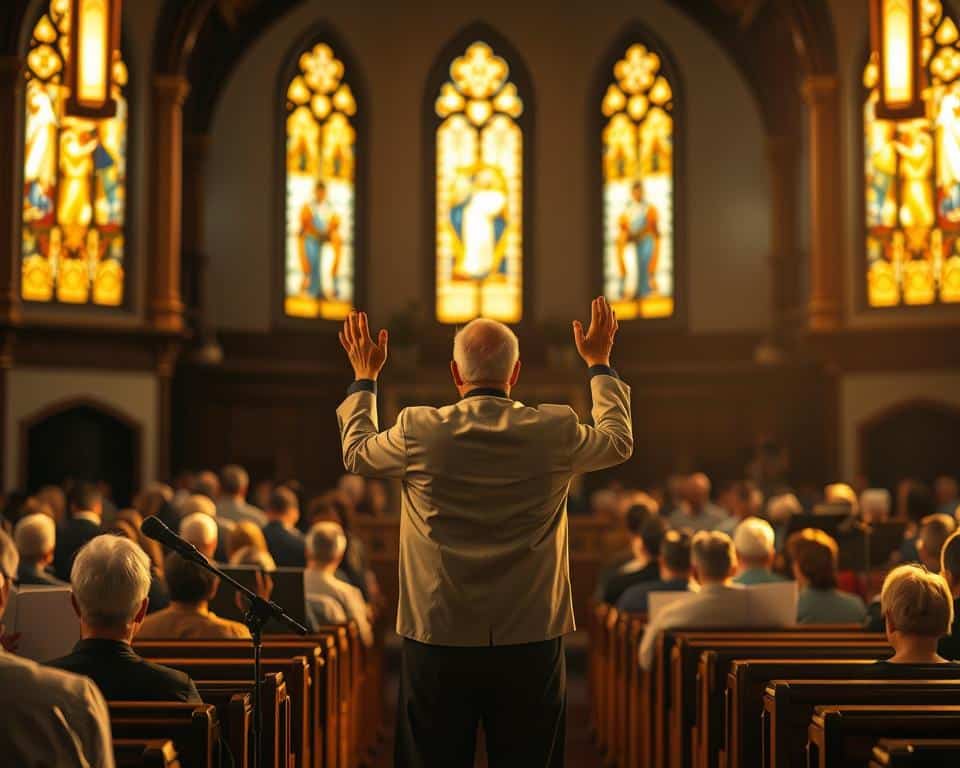“A hymn is theology on fire.” — Dr. John Tweeddale’s words remind us how deeply hymns shape faith. These timeless songs carry God’s truth in melody, helping believers worship beyond Sunday mornings.
Hymns connect you to Scripture. Like Colossians 3:16 says, they let God’s word dwell richly in your heart. Many Christians, like Dr. Tweeddale, keep hymnals at home for personal devotion. The words linger, offering hope in daily life.
In worship, hymns unite generations. They teach theology simply, focusing on God’s character. Whether sung together or alone, these songs strengthen faith. Their timeless truths remain steady, even when life feels uncertain.
From church pews to quiet moments, hymns anchor believers in Christ. They’re more than songs—they’re tools for knowing, serving, and loving God.
The Importance of Hymns in Christian Worship
Martin Luther saw hymns as a bridge between faith and emotion. He called music “next to the Word of God” in power. Hymns don’t just sound beautiful—they carry divine truth into your heart.

Hymns Fuel Praise and Worship
When you sing hymns like “How Sweet the Name of Jesus Sounds,” you proclaim Scripture. Each line reflects biblical themes, turning worship into a joyful echo of God’s word. Luther believed melodies could ignite faith deeper than sermons alone.
Congregational singing unites believers. As voices rise together, hymns create a shared language of praise. Elder Packer once noted how hymns “prepare the Spirit” in worship, binding hearts in unity.
Hymns Root Us in God’s Word
Lyrical repetition helps you memorize truth. Isaac Watts set Psalms to music, making doctrine unforgettable. For example:
- “O Worship the King” declares God’s majesty (Psalm 104).
- “My Jesus, I Love Thee” mirrors John 21:15–17.
“A hymn is theology on fire.”
Whether in church or quiet moments, hymns anchor you in Christ. They’re not just songs—they’re tools to praise God, learn truth, and grow faith.
The Historical Roots of Hymn Singing
In 1524, a hymnal changed how believers praised God. Martin Luther, the Reformation leader, saw music as vital to faith. He partnered with composer Johann Walter to create the Wittenberg hymnal, shifting worship from clergy-led choirs to congregational singing.

Democratizing Worship Through Song
Before the Reformation, only priests sang in church. Luther’s hymns let everyone join. Simple melodies and German lyrics made truth accessible. 500 years ago, this was revolutionary—faith wasn’t just heard but sung.
The Wittenberg Hymnal’s Legacy
Luther’s preface called music “a gift from God.” His hymns, like “A Mighty Fortress Is Our God,” taught Scripture. The hymnal spread Reformation ideas faster than sermons. Today, modern worship still echoes its focus on the cross and Christ’s victory.
“Next to the Word of God, music deserves the highest praise.”
You might not realize how Luther’s hymns shape worship now. They remind us that praising God is for every voice—not just the trained few.
H2: Hymns Teach Theology and Deepen Faith
Hymns distill profound truths into melodies you can carry in your heart. Like Psalm 119:11, they help God’s word dwell richly within you. These songs turn doctrine into declarations anyone can sing.
Biblical Truths in Every Verse
“O the Deep, Deep Love of Jesus” unpacks redemption with oceanic imagery. Each stanza reveals Christ’s sacrifice for sin, echoing Ephesians 3:18-19. You don’t just hear about grace—you sing it into memory.
Isaac Watts mastered simplifying theology. His hymn “When I Survey the Wondrous Cross” explains substitutionary atonement in four stanzas. Complex truths become clear when set to song.
Doctrine You Can Sing
“My Jesus, I Love Thee” centers every line on Christ’s work. The lyrics mirror 1 John 4:19: “That He who knows all my heart’s weakness knows how much I love Him.” Hymns like this keep your focus on salvation’s source.
“A mighty fortress is our God, a bulwark never failing.”
Try memorizing Scripture through hymns. Sing “I Need Thee Every Hour” based on John 15:5, and you’ll recall biblical truth when life feels overwhelming. Melodies make doctrine stick.
From Watts to Wesley, hymns teach timeless theology. They guard against error by articulating God’s truth in ways you’ll never forget.
The Corporate Power of Singing Hymns
When voices rise together in hymn, something extraordinary happens. Strangers become brothers and sisters, united by melody and truth. Hymns bind congregations across cultures, languages, and generations.
One Voice, Many Hearts
Singing hymns synchronizes hearts. Dr. Ligon Duncan notes how shared lyrics forge unity. At BYU, 60,000 missionaries once sang “Called to Serve”—a moment where thousands declared one purpose.
Hymns like “Praise to the Lord” exhort believers. Each line urges us to praise God and trust His care. As Colossians 3:16 says, these songs teach and admonish, turning pews into classrooms of grace.
Confession and Connection
“I Stand All Amazed” lets congregations confess Christ’s sacrifice together. Even in dementia, many recall hymn lyrics—proof of truth etched deep. Hymns transcend barriers, making God’s love audible.
“Singing is the voice of the church united.”
From small chapels to global gatherings, hymns remind us: we’re never alone in worship. They turn individual faith into a chorus echoing heaven.
Personal Benefits of Singing Hymns
Heather’s story proves hymns outlast pain and fear. When terminal illness struck, she whispered “There Is Sunshine in My Soul”—not as denial, but as defiance. The melody anchored her soul to God’s promises when her body failed.
Hymns Fortify Your Faith
Like Paul and Silas singing in prison (Acts 16:25), hymns become spiritual armor. They remind you of truth when doubts attack. A 2022 Baylor study found hymn-singers recall Scripture 40% faster during crises.
Try this daily practice:
- Start mornings with one hymn
- Journal how its lyrics apply to your day
- Sing it silently during stressful moments
Music Makes Truth Stick
Neurologists confirm melodies boost memory. When you sing “Blessed Assurance,” your mind links Fanny Crosby’s words to Philippians 1:6. This fusion of music and Scripture builds resilience.
“Hymns were my lifeline when cancer treatments blurred my thoughts.”
Facing death, Heather’s hymnbook became her battle plan. Now her family sings those same songs to celebrate her life. That’s the enduring power of hymns—they carry you from trial to triumph.
Your turn: Pick one hymn this week. Let its truth reshape your faith. As Ephesians 5:19 says, these songs are God’s gift for your journey.
Famous Hymns and Their Messages
Certain hymns have shaped Christian worship for centuries, carrying deep messages of faith. Their lyrics reveal God’s character, love, and promises—truths that resonate across generations. Let’s explore three classics and the biblical themes they proclaim.
“O Worship the King” and God’s Majesty
Robert Grant’s 1833 hymn paints God’s glory with poetic art. Based on Psalm 104, lines like “Thy bountiful care, what tongue can recite?” echo creation’s wonders. Each stanza magnifies His power, from “the Ancient of Days” to the “Maker, Defender”.
Grant, a British politician, turned Scripture into song. His hymn reminds us: worship isn’t passive—it’s declaring who God is.
“How Sweet the Name of Jesus Sounds” and Devotion
John Newton wrote this while wrestling with doubt. The hymn’s tender focus on Christ’s name—“sweet in the believer’s ear”—shifts attention from struggle to salvation. Newton, once a slave trader, knew grace firsthand.
Notice how each verse builds devotion. The cross appears in stanza three: “Dear dying Lamb, Thy precious blood shall never lose its power.” Even in pain, Newton’s lyrics point to hope.
“My Jesus, I Love Thee” and God’s Love
Penned by 16-year-old William Featherston, this hymn captures youthful love for Christ. Simple lines like “I know Thou art mine” mirror 1 John 4:19. Featherston’s raw honesty—“If ever I loved Thee, my Jesus, ’tis now”—still stirs hearts.
Unlike Grant’s grandeur or Newton’s repentance, Featherston’s hymn feels like a personal prayer. Yet all three share one thread: love for God expressed through song.
“Hymns are the testimony of the church set to music.”
These hymns endure because they anchor truth in melody. Whether you’re marveling at God’s majesty, clinging to Christ’s name, or whispering love to Jesus, they guide your worship—then and now.
Hymns in Modern Worship Settings
Many churches today blend ancient hymns with modern worship styles, creating a bridge between generations. About 69% still use hymnals, proving these songs remain vital. The challenge? Making centuries-old truths feel fresh for new worshippers.
Breathing New Life Into Traditional Songs
Artists like Lauren Daigle show how hymns can sound contemporary. Simplified chords and dynamic rhythms help younger people connect. Even “Amazing Grace” gains new power when paired with modern instrumentation.
Elder Packer championed hymn-based preludes before services. At one stake conference, this practice softened hearts before the message. The right arrangement prepares people to encounter God.
Creating Balanced Worship Experiences
Blended services work best when transitions feel natural. Try opening with a hymn’s modern version, then shift to its traditional form. This honors the past while embracing current expressions.
Streaming platforms play a key role in hymn revival. Platforms like Spotify introduce classic texts to listeners who’ve never entered a church. Suddenly, timeless truth meets searching hearts during commute time.
“Modern doesn’t mean shallow—it means meeting people where they are with truth that lasts.”
Want to engage youth? Start with these steps:
- Feature one hymn monthly with a backstory video
- Invite teens to help arrange acoustic versions
- Connect lyrics to current life struggles
Whether through pipe organs or praise bands, hymns continue pointing people to Christ. Their message stays the same—only the music changes. That’s the beauty of worship across time.
The Enduring Power of Hymns in Christian Life
Heaven’s chorus begins here—with hymns that outlast time. For two hundred years, these songs have carried God’s truth across continents and cultures. Doctrine & Covenants 25:12 calls them “prayers answered with blessings,” linking earthly worship to eternal life.
Today, hymns still thrive. Artists reimagine them for streaming, proving their relevance in the digital age. Yet their core remains unchanged: simple melodies that lift your spirit and anchor your faith.
Make hymnody personal. Sing them in quiet moments, as Heather did. Let their words remind you—when storms come, hope remains. One day, we’ll join the heavenly choir. Until then, keep singing.





